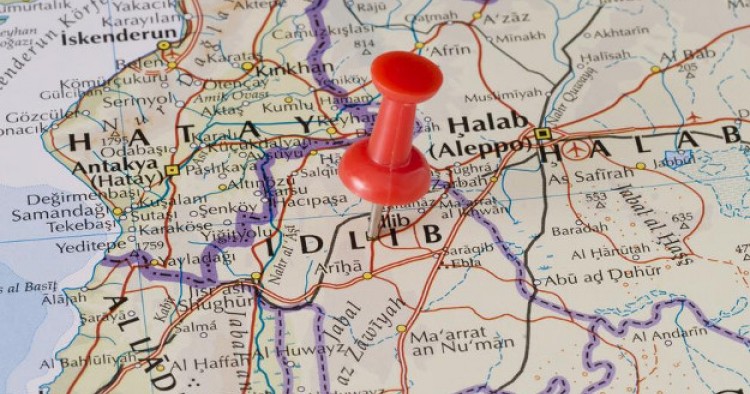Turkey has three options to tackle a looming threat to its national security emanating from the situation in Syria’s Idlib Province, according to an analysis piece by Iran’s Tabnak Agency, which is affiliated with Mohsen Rezai, the former chief commander of the Islamic Revolution Guards and current Secretary of Iran’s Expediency Council. The three options discussed in the article are: taking a unilateral military action; creating a de-escalation zone; or working with Iran and Russia for a joint military operation in Idlib.
According to Tabnak, Turkey is concerned that its Syrian rebel ally Ahrar al-Sham is losing territory in Idlib and Hay'at Tahrir al-Sham – which was formerly allied with al Qaeda under the name of Nusra Front – is now dominating the province. “Turkey faces two key security challenges in northern Syria: First, the increasing expansion of areas under the control of the Kurds; and second, the domination of Hay'at Tahrir al-Sham over a major part of Idlib Province,” it added. "What is clear is that Turkey has no good options to confront the Kurds in Raqqa because of America’s all-out support for them. In Idlib, however, the situation is different. Ankara has repeatedly declared that it will respond to any threat from Idlib Province and is ready to launch a new military operation in the province. In this regard, three scenarios about the situation in Idlib and Turkey’s potential responses should be examined."
- Unilateral Turkish military operation: Iran and Russia, according to Tabnak, oppose any unilateral move by Turkey to militarily intervene in Idlib. Quoting a Russian analyst, the article says Turkey wishes to occupy Idlib to strengthen its allies against Hay'at Tahrir al-Sham and will most likely discuss the issue at the upcoming Astana meeting. Ankara also does not want the Syrian government to capture Idlib, it adds. The article further claims that one key motive of the Turkish government to recently host senior Iranian and Russian delegations in Ankara was to convince the two countries that a Turkish military intervention is needed to liberate Idlib from Hay'at Tahrir al-Sham. Tabnak also opines that Turkish President Recep Tayyip Erdogan’s remarks on Monday suggested that Ankara is actively planning on taking military actions in Syria and Iraq.
- Establishment of De-Escalation Zones: “The second scenario suggests that Iran and Russia will not agree to Turkey’s unilateral action in Syria, particularly in Idlib, and Moscow and Tehran will present a new proposal to Ankara,” the article said. It further notes that Russia is trying to seek Turkey’s cooperation to set up a fourth de-escalation zone in Idlib in order to prevent a Turkish military action. According to Tabnak, this is the most likely and feasible option.
- Joint Turkey-Iran-Russia Military Operation: Tabnak says that while this is the least likely option, it is still possible given that the three countries have lately been seeking to find common grounds in Syria. It also refers to a recent report in Russian Sputnik News Agency, which said Russia, Iran and Turkey are preparing for a joint military offensive in Syria. “Russia and Iran will begin their operation from southern parts of Idlib City, while Turkey will advance from the northern front,” it quoted the Sputnik report.
Comment: Iran, Turkey and Russia have lately taken concrete steps to cooperate over Syria. Through the Astana process, the trio are working on a joint mechanism to reduce violence in Syria through the creation and enforcement of the so-called de-escalation zones. Relations between Tehran and Ankara are also warming up and the two countries discussed ways to cooperate more on regional issues during a visit by a high-level Iranian military delegation to Ankara last week. Syria was a top agenda item at the meetings between Iranian and Turkish officials. Daily Sabah, a Turkish pro-government outlet, quoted a Turkish diplomat as saying that the Turkish and Iranian military chiefs “shook hands on a joint de-escalation zone mechanism in Idlib, which would also include the Russian military.” But some reports later suggested that Iran, Turkey and Russia have not entirely ironed out their differences. The next round of the Astana talks, originally slated for late August, is now reportedly postponed until mid-September because of existing disagreements over Idlib.
In addition to the growing influence of Kurdish groups in northern Syria, the Turkish government is concerned about the concentration of terrorist groups in Syria’s Idlib Province and its security and humanitarian implications for Turkey. Last month, a senior Turkish delegation from the National Intelligence Organization (M.I.T.), the Turkish Armed Forces (T.S.K.) and the Foreign Ministry met Iranian and Russian officials in Tehran to discuss latest developments in Idlib and Aleppo, particularly in the district of Afrin.
The Middle East Institute (MEI) is an independent, non-partisan, non-for-profit, educational organization. It does not engage in advocacy and its scholars’ opinions are their own. MEI welcomes financial donations, but retains sole editorial control over its work and its publications reflect only the authors’ views. For a listing of MEI donors, please click here.












